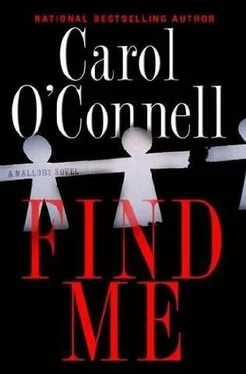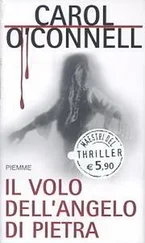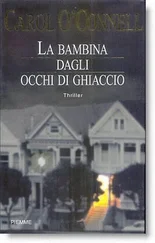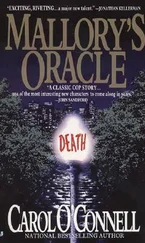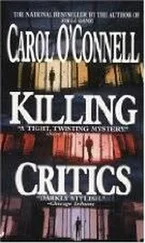He had to see her eyes when he gave her the news.
And now he thought of another question. He did not want to pry into this personal area, but he had no choice. Everything that might contribute to Mallory’s c u rrent malady was also the detective’s personal business. “Hey, Charles? Is the kid holding a grudge against you ?”
“No, why would she?” The man faced the windshield not wanting to meet his friend’s eyes, and he wore the slight blush of a lie-a small one, most likely a lie of omission. Poor Charles had a give-away face that could not hide a falsehood or a good hand in a game of cards.
The Mercedes slowed to a crawl when the sheriff ‘s o ffice was in sight. Riker was not willing to end this conversation just yet. “I’m guessing you two had a fight. Mallory holes up in her apartment for months, and you go off to Europe. What am I supposed to think? So what happened?”
“I asked her to marry me.” Charles pointed to the windshield. “Oh, look. A reception committee.”
Startled, Riker almost hit a deputy as he turned the wheel to enter the municipal lot. Another man in uniform flagged down the Mercedes and waved them into a parking space.
Charles rolled down the passenger window and asked, “We’re not late, are we?”
“No, sir,” said the deputy. “Things just got off to an early start. The FBI agents didn’t w ant to wait.” He ushered them inside the building and down the hall to a small conference room and a meeting in progress.
Sheriff Banner made the introductions, gesturing first to the old man. “You’ve met Dr. Magritte.” He turned to face two strangers on the other side of the room. “But not these folks.”
Riker had expected to see a young couple from the caravan, the two people he had picked out for embedded FBI moles, but these were new faces. He ignored the younger agent, who had just started shaving last week, and he stared at the woman.
No one would call her pretty, but she was appealing. He would guess her age at forty by the strands of silver mixed in with the brown, but the short haircut gave her a youthful tomboy look. And a man could get lost in those tranquil gray eyes. The sun had popped out a few freckles on her nose, and she had a slight overbite; these were Riker’s o t her favorite qualities in a woman. The lady was dressed from a catalogue for campers. There was even a Swiss Army knife clipped to her belt. Riker wondered where she carried her gun; it was that well hidden.
The light-haired man beside her was attired from the same mail-order box, but he was much younger, a recent graduate of the FBI academy with the requisite well-scrubbed, earnest face-no wrinkles, no experience.
“Agents Christine Nahlman and Barry Allen,” said the sheriff. “They’ll be traveling undercover with the caravan. Dr. Magritte’s cooperating with the FBI.”
“So that makes four of you,” said Riker, nodding to the woman. In this count, he was including the two campers he believed to be FBI moles. Agent Nahlman’s s ilence was slightly frosty, neatly confirming this theory.
“This is for you.” Sheriff Banner reached across the conference table to hand a folded paper to Riker. “It’s a message from their boss, the agent in charge. He called this morning to make their arrangements.”
Riker opened the sheet of paper and read Dale Berman’s s imple question, “What’s eating Mallory?” This was followed by the FBI man’s c o veted cell-phone number, one that even Dale’s wife would not have.
Trouble.
The detective waved this note as he faced the two federal agents. “So you guys met my partner? Detective Mallory?”
Oh, yes, they had-no doubt about it. And, in the strained exchange of glances between them, he could see that theirs had not been a happy experience. Riker smiled. “The kid makes a hell of a first impression, doesn’t she?” And by that, he meant permanent damage. “So how’s old Dale? Haven’t seen the guy in a while. No recent bullet holes, no broken bones?”
“She kicked him in the balls.” Agent Barry Allen’s voice had a trace of awe.
“That’s my baby.” Riker said this with pride-and relief. Dale Berman’s punishment could have been so much worse.
After looking over the FBI-approved route map, he listened to their plans to make Oklahoma by nightfall and agreed that it was doable on the interstate, where they could get up some speed. Then he sided with Dr. Magritte after hearing the old man’s c o ncerns about the proposed hotel.
“The doc’s right. They should camp on this private land.” Riker held up the map marked with a prearranged site. “It’s isolated, easier to keep all the sheep together. Yo u don’t w anna move these people indoors tonight, not even if it rains. No walls between them and you.”
Nahlman, the older, seasoned field agent, was nodding in agreement, but her younger partner asked, “Why?”
“Well,” said Riker, always patient with kids, “you wanna be able to hear the screams.”
“Your dad only stayed two weeks that last visit,” said Ray Adler. “Just time enough to rebuild the wrecked Porsche.”
Mallory was hardly listening anymore. She stared at the photograph of her father, taken when he was her own age. His blond hair was tied back, and his smile was slightly crooked and winning. “Handsome and wild,” her mother once said on that rare occasion when she was willing to talk about him with her six-year-old daughter. The photograph had one other detail, a pair of wire-rimmed spectacles tucked into the breast pocket of his shirt. “He wore glasses.”
“Well, he owned glasses.” Ray laid down an earlier photograph of himself and Peyton Hale as teenage boys. “Your dad’s only sixteen in this one.
See the eyeglasses in his pocket? Never once caught him wearing them. Men can be as vain as women-sometimes more so.”
Ray wore his own spectacles as he sorted through the papers in the box. “Your dad wrote me from time to time. Always got a Christmas card. After he came through that last time, I got a few postcards from the road, then nothing.” Sitting well back in his chair, he pushed his glasses to the top of his head. “Nothing in all this time.” Ray heaved a sigh, then looked down at the floor for a moment of silence. “I love Peyton Hale. And I wouldn’t say that about another man in this world.” He turned his sad eyes to Mallory. “If you meet your father on the road, you give him my regards. If he’s dead, then lie to me. I don’t e ver want to hear that.”
He pushed the box toward her. “That’s all yours now. Old notebooks, more pictures and such. You might want some quiet time to look it over.” He rose from the table. “And now, if you’ll excuse me, I’ve gotta check on my crew. I’ve got them working on a roll bar for that car of yours.”
“I don’t want a roll bar.”
“But you’re gonna get one. If you flip that thing, you’ll die.”
Having already seen a gravestone with her name on it, Mallory did not offer further protest. When Ray had quit the house, she opened one of Peyton Hale’s notebooks and read the opening lines. “In the beginning, there was the wheel. Then along came the fire of the internal combustion engine. The car was born. And away we go. It’s a romance that has no end.”
Next she picked up the photograph of her parents posed with Savannah Sirus. After ripping the latter-the interloper-from the picture, Mallory dropped the torn piece into an ashtray and looked around for matches to burn it. Throwing Savannah into the garbage can was not enough. Only total destruction would do.
The two parents from the caravan had arrived. They were excited and hopeful. Anticipation was everything to them. These two still abided in that fantasy world where little girls never died, where a lost child could still be found innocently wandering in the woods, perhaps a little dirty after all this time-years of time-but no worse for wear, no harm done-not dead, not murdered. The mother and father were looking into the corners of the room, leaning a bit to see around the long table and chairs. Charles Butler winced. They thought they were here to pick up their living daughter and take her home.
Читать дальше
